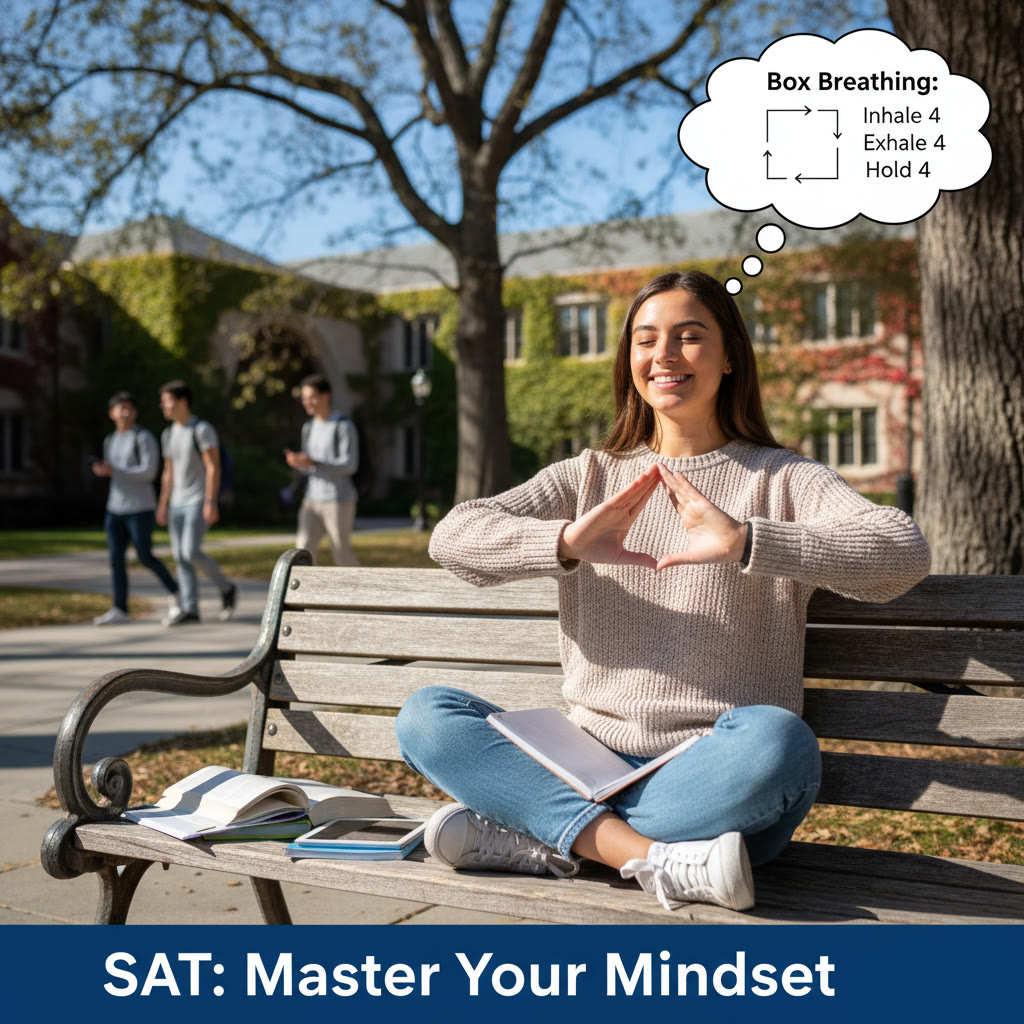How to Build Emotional Resilience While Preparing for the SAT
Preparing for the SAT is as much an emotional marathon as it is an academic one. You can memorize formulas, sharpen reading strategies, and time your practice tests until your pencil breaks, but if you don’t tend to what’s happening inside your head and heart, small setbacks can feel enormous. This post is a friendly guide to strengthening your emotional resilience so the SAT becomes a challenge you can meet, not a threat that overwhelms you.
Why emotional resilience matters for SAT success
Resilience is the mental muscle that helps you recover from setbacks, keep motivation steady, and perform well under pressure. For SAT students, resilience means:
- Approaching practice tests as information, not judgment.
- Recovering quickly from a disappointing score or a bad study day.
- Maintaining focus through long study hours and during the actual test.
- Balancing ambition with self-compassion so burnout doesn’t derail progress.
Psychology research shows that students who use adaptive coping strategies—like reframing mistakes as opportunities and maintaining routines—perform better and retain knowledge longer. In short: resilience doesn’t replace content knowledge, but it multiplies the effect of your study time.
Start with a mindset shift: learning over proving
One of the most powerful changes you can make is how you talk to yourself about the SAT. Replace “I must prove I’m smart” with “I’m learning what I need to do well.” That small language shift changes the stakes. When the goal is learning, mistakes are part of the process rather than evidence of failure.
Practice a few reframing statements and keep them visible while you study. Examples:
- “A low practice score tells me what to fix.”
- “This difficult passage is training my attention.”
- “I’ll focus on progress this week, not perfection today.”
Practical daily habits to build resilience
Resilience grows from habits. The list below mixes emotional strategy with concrete study practices so mind and skills develop together.
1. Start short, end reflective
Begin each study session with a two-minute check-in: How am I feeling? What’s one achievable goal for this session? End with a short reflection: What went well? One thing to fix next time. This ritual trains your brain to move between focus and evaluation calmly.
2. Use micro-goals and celebrate small wins
Large goals like “raise my score by 150 points” are motivating but vague. Break them into micro-goals: finish a problem set, learn five vocabulary words, reduce errors in sentence completion by two. Ticking off micro-goals produces regular dopamine boosts—motivation-reinforcing wins that keep you going.
3. Build a recovery routine for bad days
Everyone has an off day. Plan a recovery routine in advance so a bad practice test doesn’t turn into a week of self-criticism. Your routine might include a short walk, one healthy snack, 20 minutes of light review focused on one mistake type, and a 10-minute relaxation practice.
4. Sleep, movement, and food as cognitive hygiene
Sleep consolidates memory; exercise improves mood and cognitive flexibility; balanced meals keep attention steady. These aren’t optional extras—they are study multipliers. Aim for consistent sleep, short movement breaks during study, and protein-rich snacks before long sessions.
Strategies to manage test anxiety in the moment
On test day and during timed sections, anxiety can spike. Equip yourself with micro-skills to neutralize it quickly.
Box breathing and other quick techniques
Box breathing: inhale 4, hold 4, exhale 4, hold 4. Four rounds can slow heart rate and clear attention. Pair breathing with grounding techniques: feel the chair under you, name three sounds in the room, press your feet flat on the floor. These quick practices bring you back to the task at hand.
Use a performance script
Create a short script you can say silently in stressful moments: “Breathe. Read the question fully. I have solved problems before—I can do this.” Scripts reduce the load on working memory so you can use it for reasoning instead of worry.
Designing study plans that protect your emotions
A study plan that’s humane is more sustainable. Here’s how to structure study time so you make progress without burning out.
Cycle intensity and rest
Use a weekly cycle of focused work days and recovery days. For example: three focused days (practice, content review, timed sections), one active recovery day (light review, move, socialize), repeat. This rhythm prevents mental fatigue from building up.
Mix practice types
Alternating hard cognitive work with lower-load activities helps endurance. Don’t do three hours of heavy timed practice in a row. Interleave one focused hour of problem solving with an hour of review, vocabulary, or reading for enjoyment.
Keep regular mini-mock tests
Short, regular mock tests reduce the novelty of the test environment. A full-length test is important, but weekly 30–60 minute timed sections teach pacing and reduce unpredictability—one of the major drivers of anxiety.
How to interpret practice test results without losing momentum
Practice test scores are data points, not verdicts. Here’s a simple, effective process for interpreting them in a way that builds resilience.
- Step 1: Name the feeling. Are you frustrated, deflated, or calm? Pause and label it.
- Step 2: Extract the signal. Look at patterns: which question types, timing issues, or careless mistakes recurred?
- Step 3: Make one focused corrective action for the next week based on that signal.
- Step 4: Schedule a small, confidence-building win (easy practice or concept review) before you tackle the corrective work.
This process prevents the common cycle where a bad test leads to unfocused study, which leads to another bad test. Focused correction plus small wins builds momentum.
Table: Quick strategies matched to common SAT setbacks
| Common Setback | Emotional Impact | Immediate Strategy | Longer-term Fix |
|---|---|---|---|
| Low practice test score | Deflated, anxious | Label feeling, take a 20-minute break, review one error type | Weekly targeted practice on that error type + a micro-test each week |
| Time pressure in sections | Rushed, panicked | Box breathing for 60 seconds, skip and return to hard problems | Pacing drills and regular timed sections to build rhythm |
| Consistent careless mistakes | Annoyed, self-critical | Slow down for the next 10 questions, verbalize steps | Introduce deliberate practice focusing on checking and self-questioning |
| Stagnant score despite many hours | Frustrated, hopeless | Review study plan, add a rest day, seek external feedback | Revise plan with targeted goals and expert guidance |
Emotional habits for sustained motivation
Long-term resilience is less about occasional heroic efforts and more about steady habits that protect motivation and mental energy.
Keep a progress notebook
Each week, jot three things that improved and one area to continue. This turns vague effort into visible progress and helps you notice small gains that otherwise disappear.
Use accountability without pressure
Study buddies or a coach can help keep momentum. The key is nonjudgmental accountability—someone who asks, “What did you try this week?” rather than, “Why didn’t you do more?” Sparkl’s personalized tutoring offers one-on-one guidance and tailored study plans that can provide that encouraging structure while pinpointing weak spots. Having an expert tutor can convert frustration into focused action.
Ritualize transition moments
Create a short ritual to begin and end study sessions—make a cup of tea, set a timer, say a line from your performance script. Rituals signal to your brain when it’s time to focus and when it’s okay to rest.
When to bring in extra help
Sometimes resilience needs a partner. If you find that anxiety is persistent, interfering with sleep, or dominating your thoughts, seeking additional support is wise. For many students, targeted tutoring provides not only content help but emotional scaffolding—expert tutors can break problems into manageable chunks and create a tailored plan that reduces overwhelm. Sparkl’s personalized tutoring combines expert tutors with AI-driven insights to create customized lessons, 1-on-1 guidance, and progress tracking—helpful when your study plateau stops responding to solo effort.
What extra help can do
- Diagnose precise weaknesses so your study time is efficient.
- Provide a compassionate, practical coach who frames setbacks as data.
- Offer accountability that feels supportive, not punitive.
Examples from real study life
Here are a couple of short, realistic scenarios and how resilience practices change the outcome.
Case 1: Jamie, the perfectionist
Jamie spent 6 hours a day reviewing every missed question until midnight, then crumpled after one low practice score. With resilience work, Jamie began using micro-goals, set a 90-minute daily limit, and used a recovery routine after hard tests: a walk, a 10-minute reflection, and one targeted correction the next day. The result: more consistent study, less burnout, and steady improvement over two months.
Case 2: Alex, the anxious runner
Alex had perfect content knowledge but froze during timed sections. Introducing simulated timed sections, box breathing before each section, and a pacing checklist reduced panic. Alex also practiced skipping hard questions and returning to them. Anxiety fell and scores rose—because the test environment became familiar instead of terrifying.
Weekly resilience-building checklist
Use this checklist to make emotional fitness a concrete part of your prep.
- One full-length practice test (or two half-tests) under realistic conditions.
- Three focused practice sessions with micro-goals.
- One active recovery day with movement and leisure reading.
- A 5-minute reflection at the end of each study day noting one win.
- One conversation with a tutor, mentor, or friend to process setbacks.
When progress feels slow: a strategy to stay hopeful
Slow progress is normal. To avoid despair, set process goals rather than outcome goals. For example, aim to complete four targeted practice sets per week rather than a specific score jump. Process goals keep you focused on controllable actions. Pair them with small tangible rewards—an hour with a favorite show after a week of consistent practice, for example.
Image ideas


Final note: resilience is a skill you can train
Building emotional resilience while preparing for the SAT is an investment that pays off beyond the test. The habits you form—managing anxiety, recovering from setbacks, structuring study in a humane way—will serve you in college and life. Remember: progress is rarely linear. Expect ups and downs, and give yourself policies for how to respond to both.
If you ever feel stuck, remember help exists that is both practical and personalized. Sparkl’s personalized tutoring can add structure and compassionate expertise—1-on-1 guidance, tailored study plans, expert tutors, and AI-driven insights that identify what to work on next. Those resources are worth considering when you want to turn emotional momentum into measurable score improvement.
Take a deep breath. Make a small, specific plan for your next study session. Celebrate the completion of that plan. Do that again tomorrow. Resilience grows in the repetition.
Good luck—steady work, small wins, and a resilient mindset will get you where you want to go.













No Comments
Leave a comment Cancel